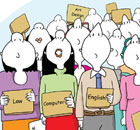Government and Policy
China starts slowly in 2010 race against inflation
(Agencies)
Updated: 2010-01-05 17:09
 |
Large Medium Small |
TENTATIVE TIGHTENING
It is by no means too late for Beijing to tamp down on the price pressures. Much will rest on how it applies bank lending controls - a far more important tool than interest rates in Chinese monetary policy.
Record new bank credit in 2009 of nearly 10 trillion yuan ($1.5 trillion) was heavily concentrated in the first half. This is the usual lending pattern in China and one that the government is determined to break, insisting in recent pronouncements that banks lend more evenly throughout this year.
So all eyes will be on new loans data in the first quarter.
Loans of more than 1 trillion yuan a month could fuel steep price rises and signal "drastic tightening" down the road, Yu said. But if officials succeed in controlling lending, the economy will be on its way to achieving high growth and low inflation, he said.
Chinese leaders from Premier Wen Jiabao to central bank governor Zhou Xiaochuan have pledged in recent weeks that they will maintain appropriately loose monetary policy while also "enhancing flexibility". Observers have interpreted this as an indication of their intention to gradually step up tightening.
Indeed, over the past month, Beijing has scaled back a tax exemption on property sales, increased a tax on auto purchases, vowed to crack down on speculation in the sizzling housing market and given banks stricter lending guidelines.
"There is no doubt that the government is heading in the correct direction and it chose the right time to start, but the most challenging point is how to control the pace of tightening," Gao Shanwen, an economist at Essence Securities in Beijing, said.
MANAGING LIQUIDITY
The central bank has also started using open-market operations to delicately tighten policy. It has conducted net cash drains from the market for 12 straight weeks, including in a surprise reverse repurchase agreement on the last day of 2009.
Yet, basic liquidity management should not be confused with more serious tightening. About 2 trillion yuan, more than one-quarter of China's annual 2009 budget, had been due to be allocated in December; the central bank needed to mop up some of the cash sloshing about as a result.
"The government is unlikely to take extremely aggressive tightening measures in 2010, as it is still not fully confident about the foundations of the economic recovery," Gao said.
Few analysts think the People's Bank of China will raise banks' reserve requirements or interest rates until headline inflation really catches the public's attention, perhaps sometime late in the second quarter.
Currency appreciation would, in normal circumstances, help serve tightening goals. But Beijing seems almost paralysed by fears that a strengthening yuan would attract currency speculators, the hot money inflows revving up inflation.
Zhang Ming, an economist at the Chinese Academy of Social Sciences, the top government think-tank, forecast that the yuan would rise by less than 5 percent against the dollar this year. Offshore forwards pricing suggests investors currently expect the yuan to appreciate about 2.7 percent.
"We can rule out the possibility of a big one-off revaluation," Zhang said. "And, of course, if the dollar's real effective exchange rate increases, then the yuan will have less need to appreciate against it."







